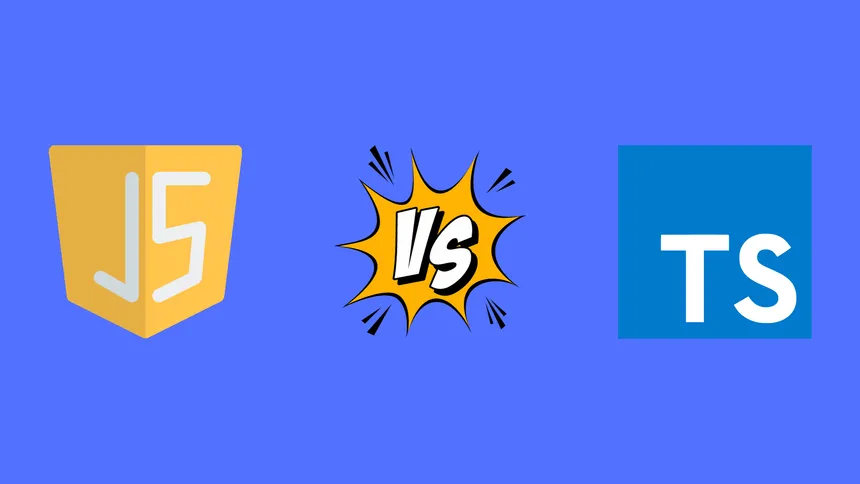JavaScript vs. TypeScript: A Comprehensive Comparison
 Rohan Shrivastava
Rohan Shrivastava
JavaScript and TypeScript are two essential tools in the modern web development toolkit.
Understanding their differences, advantages, and appropriate use cases can significantly enhance a developer's productivity and the quality of their code.
This article aims to provide a detailed comparison between JavaScript and TypeScript, helping developers make informed decisions about which language to use for their projects.
JavaScript: The Ubiquitous Language
JavaScript is the backbone of web development, used for creating interactive and dynamic web pages.
It is a high-level, interpreted scripting language that conforms to the ECMAScript specification.
JavaScript is supported by all modern web browsers, making it an essential skill for front-end developers.
Advantages of JavaScript
Wide Adoption: JavaScript is ubiquitous, supported by all web browsers, and has a vast ecosystem of libraries and frameworks such as React, Angular, and Vue.js.
Interactivity: JavaScript enables dynamic content, allowing developers to create interactive web applications.
Asynchronous Programming: JavaScript's event-driven nature and support for asynchronous programming (using callbacks, promises, and async/await) make it ideal for handling tasks like API calls and I/O operations.
Versatility: JavaScript can be used on the server side (with Node.js), for mobile app development (with React Native), and even for desktop applications (with Electron).
TypeScript: JavaScript with Superpowers
TypeScript, developed by Microsoft, is a statically typed superset of JavaScript. It extends JavaScript by adding optional static types, interfaces, and other features that enhance the development experience and code quality.
Advantages of TypeScript
Static Typing: TypeScript's static type system helps catch errors at compile-time rather than runtime, leading to more robust and maintainable code.
Improved IDE Support: The static types enable better IntelliSense, code navigation, and refactoring capabilities in IDEs like Visual Studio Code.
Enhanced Readability and Maintainability: TypeScript's type annotations and interfaces make the code more self-documenting and easier to understand.
Modern JavaScript Features: TypeScript includes all the latest ECMAScript features, even those not yet supported by all browsers, and transpiles them into backward-compatible JavaScript.
Large-Scale Development: TypeScript is particularly beneficial for large-scale applications where code quality, maintainability, and developer collaboration are critical.
Comparing JavaScript and TypeScript
| Feature | JavaScript | TypeScript |
| Typing | Dynamic | Static (optional) |
| Error Detection | Runtime | Compile-time |
| IDE Support | Basic | Advanced (IntelliSense, refactoring, navigation) |
| Learning Curve | Easier for beginners | Slightly steeper due to type system |
| Tooling | Extensive ecosystem | Built on JavaScript's ecosystem, with additional tools |
| Scalability | Suitable for small to medium projects | Ideal for large-scale applications |
| Adoption | Widely adopted, essential for web development | Increasing adoption, especially in large projects |
When to Use JavaScript
Small Projects: For small-scale applications or scripts, JavaScript's simplicity and ease of use are advantageous.
Prototyping: When quick prototyping is required, JavaScript allows for rapid development without the need for a complex build process.
Existing Projects: If you are working on an existing codebase that uses JavaScript, it may be more practical to continue with JavaScript.
When to Use TypeScript
Large-Scale Applications: TypeScript is ideal for large projects where maintainability, scalability, and collaboration are essential.
Team Development: In a team setting, TypeScript's static typing helps enforce coding standards and reduces the likelihood of runtime errors.
Code Quality: If your project demands high code quality and robustness, TypeScript's compile-time error checking is invaluable.
Modern Features: TypeScript allows you to use modern JavaScript features even before they are supported in all browsers, making it future-proof.
Special Use Cases for Developers
JavaScript:
Front-End Development: JavaScript remains the core language for front-end development, powering frameworks like React, Vue, and Angular.
Server-Side Development: With Node.js, JavaScript can be used for server-side applications, providing a unified language for both front-end and back-end development.
Hybrid Mobile Apps: Frameworks like React Native enable developers to build cross-platform mobile applications using JavaScript.
TypeScript:
Enterprise Applications: TypeScript's type system and tooling make it suitable for enterprise-level applications that require long-term maintenance.
Open Source Projects: Many popular open-source projects, such as Angular and Deno, are built with TypeScript, leveraging its benefits for code quality and collaboration.
Developer Tools: TypeScript is often used in developing developer tools and libraries, where type safety and API design are critical.
Conclusion
Both JavaScript and TypeScript have their unique strengths and use cases.
JavaScript's simplicity and widespread adoption make it an excellent choice for many web development projects, especially smaller ones.
On the other hand, TypeScript's robust type system and enhanced tooling support make it ideal for large-scale applications and collaborative development environments.
By understanding the advantages and appropriate use cases of each language, developers can make informed decisions that lead to better, more maintainable code.
Subscribe to my newsletter
Read articles from Rohan Shrivastava directly inside your inbox. Subscribe to the newsletter, and don't miss out.
Written by

Rohan Shrivastava
Rohan Shrivastava
Hi, I'm Rohan, a B.Tech graduate in Computer Science (Batch 2022) with expertise in web development (HTML, CSS, JavaScript, Bootstrap, PHP, XAMPP). My journey expanded with certifications and intensive training at Infosys, covering DBMS, Java, SQL, Ansible, and networking. I've successfully delivered projects, including a dynamic e-commerce site and an Inventory Management System using Java. My proactive approach is reflected in certifications and contributions to open-source projects on GitHub. Recognized for excellence at Infosys, I bring a blend of technical proficiency and adaptability. Eager to leverage my skills and contribute to innovative projects, I'm excited about exploring new opportunities for hands-on experiences. Let's connect and explore how my skills align with your organization's goals.